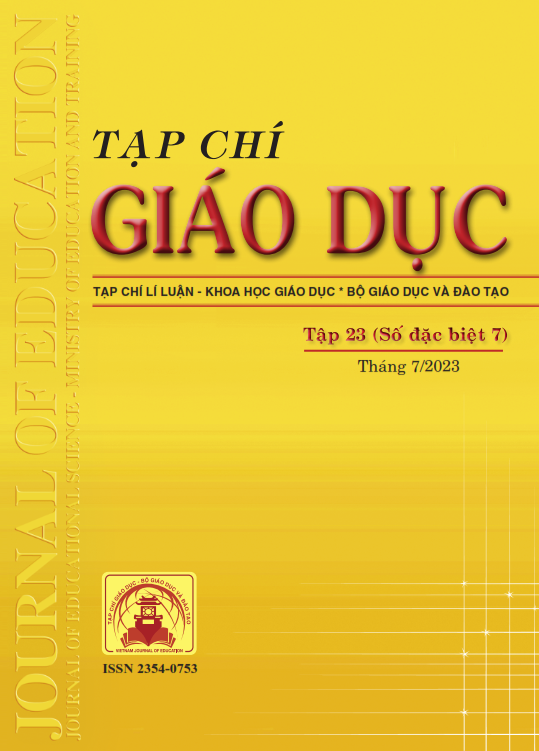Một số nghiên cứu về tiếp cận tham gia và các phương pháp sư phạm có sự tham gia của trẻ trong giáo dục mầm non
Tóm tắt
Education based on a participatory approach is essential to happiness, positivity, and mutual trust between the educator and the child. The educator is responsible for the pedagogical choices and interactions for respecting, listening, and sharing children with everyone. An educational environment based on a participatory approach is also a place where child-initiated activities are welcomed. Educators play an essential role as observers and facilitators of children's development. Based on an overview of theoretical research on participatory approach in early childhood education in the world, the article refers to participation and the issue of participatory approach in early childhood education. At the same time, some recommendations are proposed in implementing the participatory approach in preschool education institutions. The research results show that the application of participatory education helps children become active and active learners in the role of responsible and active citizens in the future.
Tài liệu tham khảo
Bae, B. (2009). Children’s Right to Participate-Challenges in Everyday Interaction. European Early Childhood Education Research Journal, 17(3), 391-406.
Bath, C. (2009). Learning to belong: exploring young children's participation at the start of school. Routledge.
Berthelsen, D., Brownlee, J., & Johansson, E. (Eds.). (2009). Participatory learning in the early years: Research and pedagogy. Routledge.
Blandford, S., & Knowles, C. (2012). Assessment for learning: a model for the development of a child's self-competence in the early years of education. Education 3-13, 40(5), 487-499.
Brownlee, J., & Berthelsen, D. (2006). Personal epistemology and relational pedagogy in early childhood teacher education programs. Early Years, 26(1), 17-29.
Clark, A. (2005). Listening to and involving young children: a review of research and practice. Early Child Development and Care, 175(6), 489-505.
Emilson, A., & Folkesson, A. M. (2006). Children's participation and teacher control. Early Child Development and Care, 176(3-4), 219-238.
Jutte, D. P., Roos, N. P., Brownell, M. D., Briggs, G., MacWilliam, L., & Roos, L. L. (2010). The ripples of adolescent motherhood: social, educational, and medical outcomes for children of teen and prior teen mothers. Academic Pediatrics, 10(5), 293-301.
Kumpulainen, K., van der Aalsvoort, G. M., & Kronqvist, E. L. (2003). Multiple lenses to peer collaboration: Explorations on children's thinking within a situative perspective. Educational and Child Psychology, 20(2), 80-99.
Leinonen, J., Brotherus, A., & Venninen, T. (2014). Children´s participation in Finnish pre-school education-Identifying, Describing and Documenting Children´s Participation. Nordic Early Childhood Education Research Journal, 7, 1-16.
Leverett, S. (2008). Children’s participation. In P. Foley & S. Leverett (Eds), Connecting with children: Developing working relationships. Bristol: Policy Press.
Nyland, B. (2009). The guiding principles of participation: Infant, toddler groups and the United Nations Convention on the Rights of the Child. In Participatory learning in the early years (pp. 42-59). Routledge.
Onnismaa, E. L., Tahkokallio, L., & Kalliala, M. (2015). From university to working life: an analysis of field-based studies in early childhood teacher education and recently graduated kindergarten teachers’ transition to work. Early Years, 35(2), 197-210.
Pramling-Samuelsson, I., & Sheridan, S. (2009). Play and learning in Swedish early childhood education. Play and learning in early childhood settings: International perspectives, 135-154.
Pulkki, J., Dahlin, B., & Värri, V. M. (2017). Environmental education as a lived-body practice? A contemplative pedagogy perspective. Journal of Philosophy of Education, 51(1), 214-229.
Shier, H. (2001). Pathways to participation: Openings, opportunities and obligations. Children & Society, 15(2), 107-117.
Smith, A. B. (2002). Interpreting and supporting participation rights: Contributions from sociocultural theory. International Journal of Children’s Rights, 10, 73-88.
UNICEF (1989). Convention on the Rights of the Child.
Van Oers, B. (2003). Learning resources in the context of play. Promoting effective learning in early childhood. European Early Childhood Education Research Journal, 11(1), 7-26.
Venninen, T., & Leinonen, J. (2013). Developing children´s participation through research and reflective practices. Asia-Pacific Journal of early childhood education, 7(1), 1-19.
Wanless, S. B., McClelland, M. M., Acock, A. C., Ponitz, C. C., Son, S. H., Lan, X., ... & Li, S. (2011). Measuring behavioral regulation in four societies. Psychological Assessment, 23(2), 364-378.
Weckström, E., Lastikka, A. L., Karlsson, L., & Pöllänen, S. (2021). Enhancing a culture of participation in early childhood education and care through narrative activities and project-based practices. Journal of Early Childhood Education Research, 10(1), 6-32.
Woodhead, M. (2006). Changing perspectives on early childhood: theory, research and policy. International Journal of Equity and Innovation in Early Childhood, 4(2), 1-43.
Đã Xuất bản
Cách trích dẫn
Số
Chuyên mục
Giấy phép

Tác phẩm này được cấp phép theo Ghi nhận tác giả của Creative Commons Giấy phép quốc tế 4.0 .












